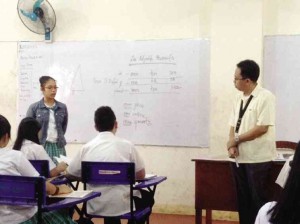
CCSHS student Phoenix Ann Margarette L. Beronio talks about her family in French in Aguilar’s third-year class.
MANILA, Philippines– Parlez vous Français?
Oui, if you’re in third or fourth year at Caloocan City Science High School (CCSHS) and you’ve been paying attention in French class.
Emmanuel Aguilar teaches the language to 82 third-year students at CCSHS, conducting the class entirely in French. Raysie Seidel does the same for the 51 seniors.
The daily dose of French that their students receive during the school year is thanks to the Special Program in Foreign Language (SPFL) of the Department of Education (DepEd).
Four other languages are in the program, namely Spanish, German, Chinese and Japanese.
Seidel and Aguilar were both teaching English (they still are) when they were told to attend intensive French lessons at Alliance Française de Manille. Neither one spoke a word of French.
Fortunately, under a grant from the French Embassy, the Alliance sessions were followed by a monthlong immersion in France where the teachers attended more classes at a language institute and lived with French families. The trip allowed the teachers to experience the French life and culture first-hand, albeit briefly.
“I became a more confident teacher,” says Seidel of her French sojourn. “I also learned to eat salad there. And I would save some bread from my lunch because they eat dinner very late there and my stomach would grumble.”
Like her, Aguilar is able to share with students—in fluent French—things that he has personally seen and experienced during the trip. He learned to drink wine because, well, he stayed in the south of France, a producer of world-renown wines.
The CCSHS teachers are among the 19 language teachers from public science high schools selected for the pilot implementation of the 2009 agreement between the French Embassy and the DepEd to include French language instruction in the third- and fourth-year curriculum. (See related story below.)
“Most of the lessons are on French grammar, so it is not a problem to carry on the entire lesson in French. The students will get the lesson,” says Seidel. Also, the textbook is pretty visual. “But sometimes, we do need to explain some things in English, especially when we’re teaching about French culture.”
Aguilar says he uses a lot of visual cues. He draws on the board, gestures or signs. “The students are slow in the beginning and we sometimes have to translate some words into English. But once they pick up, there is no need for translation,” says Aguilar.
In time, the students are able to respond in the language, which is the beauty of daily instruction.
“Even if the students’ recitations are grammatically not perfect, it is OK because what is important is that they gain the confidence to speak in French,” says Aguilar.
French class is not all grammar, though. Lessons about French culture acquaint the students with Charles de Gaulle’s country. The students create artwork depicting French life, including the iconic Eiffel Tower, of course.
Last year, graduating student Ella Aubrey Victoria Castro won first place in the French oratorical contest and placed second in French cosplay in the DepEd National Festival of Talents. Seidel wrote the winning oratorical piece. The school also participates in the French Embassy-sponsored contest every March. CCSHS placed second in the Amazing Race to the University of the Philippines group of French majors last year. (See related story above.)
“When our students graduate, they will have learned Mandarin and French besides English,” says Carleen S. Sedilla, CCSHS officer in charge and concurrently coordinator for foreign languages in the school division. Mandarin is taught to first- and second-year students.
CCSHS has three sections in each level except the senior year, which has only two. “We’re very selective,” says Sedilla. “We do not accept transferees. Our students have to maintain an 85-percent average. We start out with more than a hundred freshmen but only half survive to graduate.”
She says that in the entire city, only CCSHS is offering French and Mandarin. “The parents are very appreciative that their children can speak a foreign language,” she says. “It is a privilege for the students.”
Sedilla says the best thing about the French program is that it develops among the students an interest in foreign languages. “Those who have an aptitude for learning language can take more units in French in college and can look for more opportunities,” she says. They can take the French proficiency test recognized around the world that can help qualify them for graduate and postgraduate studies in France, perhaps even for scholarships.
The same applies to teachers like Aguilar and Seidel, both of whom are likely to be sent for another month of immersion in France as a result of a renewed agreement between the DepEd and the French Embassy.